Past Events
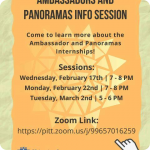
- Online (Zoom)
This info session is open to all students wanting to hear more about the Ambassador and/or Panoramas Internships. Come to meet current Ambassadors and Panoramas Interns and find out about the application process and what the positions involve! Zoom link: https://pitt.zoom.us/j/99657016259

- Isabel Morales
Join us on Friday, February 26th at 4:15 pm for our next Panoramas Roundtable to discuss our featured article: "Analyzing the Roots of Migration in Central America's Northern Triangle," written by Panoramas Intern, Isabel Morales. To read the article, please visit: panoramas.pitt.edu Every year, around 500,000 refugees and asylum-seekers flee from El Salvador, Guatemala, and Honduras. These three countries comprise a region known as the Northern Triangle of Central America, which is plagued with socio-economic instability, poverty, corruption, and chronic violence. Today, there are misconceptions and limited views regarding the causes of the humanitarian crisis in the region. These should be re-assessed by analyzing the root causes that sparked new incentives for migration, which are crucial to understanding the many interrelated factors affecting the Northern Triangle and its people. Isabel Morales is an international student from Colombia at the University of Pittsburgh. She is currently a sophomore majoring in Economics with a minor in French and a Certificate in Latin American Studies. Through her experiences living in Colombia, the United States, and Israel, along with the opportunities offered by the university, she has become greatly interested in Latin American affairs and its role in the study of development economics. As a Panoramas intern, Isabel hopes to promote the region and continue exploring areas of interest such as politics, development, and human rights. Registration required: https://tinyurl.com/1vc6cqvj

- Pedro X. Molina and Mario Sánchez
While the CLAS @ Pitt Crimes Against Humanity Series has previously focused on well-documented and covered crimes and government policies in the Southern Cone (Argentina, Chile and Brazil in particular), more recent, ongoing issues involving large-scale dynamics are ever more important. One such case is Colombia and the worrying trend of targeted assassination of community activists involved in the transformational potential of the Peace Process that commenced with the 2016 Peace Accords of the Santos administration (2010-2018). On February 25th, acclaimed editorial cartoonist Pedro X. Molina (in exile in the United States) and UCA’s Mario Sánchez and Social Scientist will reflect on the events that followed the student protests of April 2018 in Nicaragua, as well as the antecedents and the political and social context within which their echo has impacted daily life in the country. Registration required: https://tinyurl.com/y5t2vv4u Photo credit for poster: Orlando Valenzuela
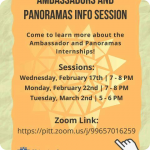
- Online (Zoom)
This info session is open to all students wanting to hear more about the Ambassador and/or Panoramas Internships. Come to meet current Ambassadors and Panoramas Interns and find out about the application process and what the positions involve! Zoom link: https://pitt.zoom.us/j/99657016259
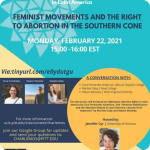
- Mariela Daby, Mason Moseley, and Cora Fernandez Anderson
- Online (Zoom)
The eleventh Charlemos event will take place on Monday, February 22, 2021 at 3 pm. The topic of discussion will be Feminist Movements and Reproductive Rights in the Southern Cone. Cora Fernández Anderson (Mount Holyoke College) will talk about her new book, Fighting for Abortion Rights in Latin America: Social Movements, State Allies, and Institutions and Mariela Daby (Reed College) and Mason Moseley (West Virginia University) will discuss their new article, "Feminist Mobilization and the Abortion Debate in Latin America: Lessons from Argentina," published in Politics & Gender. The talk will be in Spanish. To access the readings, please visit our webpage: https://www.ucis.pitt.edu/clas/content/charlemos Registration is required: https://tinyurl.com/e0ydutgu
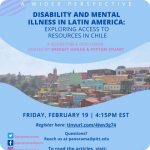
- Bridget Hogue and Peyton Stuart
- Online (Zoom)
The lack of resources for mental health and disabilities in Chile represents a pattern of slow but progressive growth in Latin America. The current health insurance system creates segmentation among high-risk individuals, which has caused an accumulation of people with psychiatric disabilities in the public sector. For those with intellectual and physical disabilities, the country is seeing a shift towards a more inclusive workforce and education system. The quality and quantity of resources is heavily influenced by a long-lasting stigma toward disability and mental illness. While attitudes toward physical or visible disabilities seem to be shifting towards acceptance, more efforts are needed to improve the perception of people with mental disorders. Bridget Hogue and Peyton Stuart will lead this week's round table. The article will be available to read on https://panoramas.pitt.edu. Registration Required: https://tinyurl.com/4jwv3g74

- Anabelle Hoffman, Founder & Director, HealTogether CIC
- Zoom Discussion
HealTogether CIC is a community enterprise organization with a vision for improving access for mental health care services for the Somali community in England and Wales. Anabelle joins us from the UK to discuss starting her own organization to help fellow Somalis in her community after a lockdown and a furlough. She spent 15 years in HR and Talent Acquisition before actualizing her dream during Covid-19.
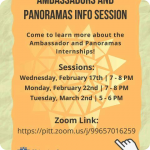
- Online (Zoom)
This info session is open to all students wanting to hear more about the Ambassador and/or Panoramas Internships. Come to meet current Ambassadors and Panoramas Interns and find out about the application process and what the positions involve! Zoom link: https://pitt.zoom.us/j/99657016259

- Caelan Hidalgo Schick
- Online (Zoom)
The Latin America and the Caribbean Competency Virtual Series is an opportunity for students to learn more about different topics related to this area and connect with the guest speakers outside of the classroom environment. The students will also have the chance of discussing and asking questions regarding the topic of the presentation. The first presentation will be by Caelan Hidalgo Schick, Panoramas Graduate Coordinator and Graduate student in the Graduate School of Public and International Affairs. She will be talking about how the rising popularity of products marketed as “superfoods” is leading to questioning of how sustainable these “trendy” foods and products truly are. Consumers of superfoods from rich northern countries are unknowingly contributing to unsustainable agriculture exploitation of indigenous farmers and land, and forced labor practices. Registration is required: https://tinyurl.com/virtualseries1 You can earn myPittGlobal and OCC credit and a certificate of participation by attending!

- Abby Neiser
- Online (Zoom)
With lithium-ion batteries powering electric cars, lithium mining is likely to be a high-demand industry in the coming years. Much of the world’s lithium is found in the Lithium Triangle in Chile, Argentina, and Bolivia. While at face value mining in the Lithium Triangle may be a good economic opportunity to power a more environmentally friendly means of transportation, the impact that it has on the environment and local communities raises the question of how sustainable it really is. Abby Neiser is a senior at the University of Pittsburgh majoring in Political Science and Spanish with a minor in Portuguese and a Certificate in Latin American Studies. During the summer of 2019, she studied abroad in Cuba as part of the Pitt in Cuba program. She is also the President of the Luso-Brazilian Student Association at Pitt. She is one of the 2020-2021 Panoramas Interns. Article Link Registration Link: https://tinyurl.com/yxex3ghz

- Online (Zoom)
CLAS & the Center for Health Equity co-sponsor this reading group. We will discuss the conclusion of Matthew H. Rafalow's "Digital divisions: How schools create inequality in the tech era". The book chapter talks about technology, play, and discipline and how it plays in different environments. Pitt has access to this book.
With the support of the Center for Latin American Studies, we explore 1) the problems Latinos in small yet rapidly growing populations face, and 2) how to solve those problems. We hope to get new writing and research collaborations going! Open to all interested: students, faculty, staff, and practitioners from Pitt and beyond. If you want to get extra network time, we will be there 30 minutes before and after the meeting time.
Link: https://pitt.zoom.us/j/98312512267
Meeting Passcode: Latinx

The tenth Charlemos event will take place on Monday, February 8, 2021 at 3 pm. The topic of discussion will be "China in Latin America: Economic Dependency and Public Opinion. Barbara Stallings (Brown University) will discuss her paper, "A Dependency Perspective on the United States, China, and Latin America" and Scott Morgenstern (University of Pittsburgh) will discuss his forthcoming paper (co-authored with Asbel Bohigues, University of Salamanca), "Battling for the Hearts and Minds of Latin Americans: Covariance of Attitudes Towards the United States and China." Javier Corrales (Amherst College) will moderate the discussion. To read copies of the papers, please visit: https://www.ucis.pitt.edu/clas/content/charlemos Registration is required: https://tinyurl.com/yyyxfoyq

- Stephanie Jiménez
- Online (Zoom)
Chicano music today is very diverse, but what is the general criteria for Chicano music, if there really is any? Are there particular genres that are exclusively Chicano, or can Chicano music encompass other genres or hybrids like cumbia, rap, or rock? Is Chicano music exclusively made by Chicano people or can any Mexican and/or Mexican American musician contribute? Finally, does Chicano music have to talk about Chicano culture and/or issues? About the Round Table Discussion Leader: Stephanie Jiménez is Mexican American and was raised in Pittsburgh. They are currently pursuing a BS in environmental science and a BA in music via the global and popular music track. They are also working towards certificates in geographical information systems, Latin American studies, and sustainability. They draw on their cultural background and disciplines to forge studies on the intersections between the environment and music. Through their teaching experience at the Shuman Juvenile Detention Center (Florida Recycled), Pitt’s Center for Creativity, and the Allegheny Land Trust, they have begun exploring how science and music are tools for advocacy work. Registration required: https://tinyurl.com/yy96u3d6

- Michele Reid-Vazquez, Director, Afro-Latin American, and Afro-Latinx Studies Initiative, Associate Professor of Africana Studies, University of Pittsburgh
- Virtual - Register Online!
Join us for the second installment of the webinar series – Transnational Dialogues in Afrolatinidad – that seeks to expand transnational, transregional, and interdisciplinary exchange on contemporary and historical issues in Afro-Latin American and Afro-Latinx Studies. This webinar focuses on gender, race, identity, and health, particularly involving the experiences of Afro-Brazilians, Afro-Argentines, and U.S.-based Afro-Latinxs. Scholars working at the intersections of Africana, Latinx, Latin American and gender studies will explore the ways that these issues overlap and impact Afro-Latin Americans and their diasporic communities in the U.S. Welcome: Manuel Roman-Lacayo, Associate Director, Center for Latin American Studies, University of Pittsburgh Kia Caldwell, Professor of African, African American, and Diaspora Studies, University of North Carolina at Chapel Hill; specialist in Afro-Latin America, Brazil, Black feminism, health, sociocultural anthropology. Nancy López, Associate Vice President for Equity & Inclusion, Professor of Sociology, University of New Mexico; specialist in Afro-Latinx, gender, race, health, sociology. Erika Edwards, Associate Professor of Latin American History University of North Carolina at Charlotte; specialist in Afro-Latin America, Argentina, gender, race, identity, history. Paul Joseph López Oro, Assistant Professor of Africana Studies, Smith College; specialist in transnational Afro-Latinx, Garifuna/Central America, Black feminisms/queer theory and identity. Moderator: Michele Reid-Vazquez, Director, Afro-Latin American, and Afro-Latinx Studies Initiative, Associate Professor of Africana Studies, University of Pittsburgh Register here: https://bit.ly/3a4seFA

- Online
The Dead and the Others (Chuva é Cantoria na Aldeia dos Mortos) Fiction / Brazil, Portugal / 2018 There are no spirits or snakes tonight and the forest around the village is quiet. Fifteen year old Ihjãc has nightmares since he lost his father. He is an indigenous Krahô from the north of Brazil. Ihjãc walks into darkness, his sweaty body moves with fright. A distant chant comes through the palm trees. His father's voice calls him to the waterfall: it's time to organize a funerary feast so the spirit can depart to the dead's village. The mourning must cease. Denying his duty and in order to escape a crucial process of becoming a shaman, Ihjãc runs away to the city. Far from his people and culture, he faces the reality of being an indigenous in contemporary Brazil. —Luxbox Films Language: Krahô and Portuguese Registration is required: https://tinyurl.com/yxljmbrx Please register by February 4, 2021 at 3 pm. Around 5:30 pm you will receive an email with the Zoom link and instructions on how to access the film
- ‹ previous
- 41 of 52
- next ›

